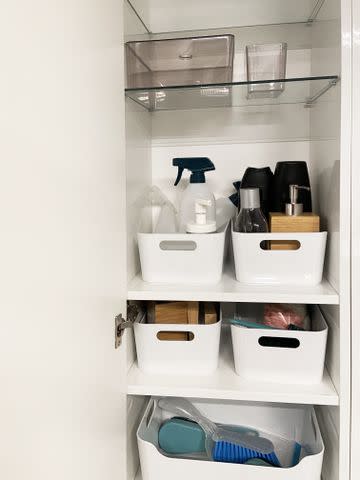7 Items in Your Cleaning Closet Pros Say to Throw Out Right Now
Your cleaning closet needs a good cleaning on a regular basis to maintain a tidy space. No matter how recently you organized yours, there are probably some items lurking in the back of the closet that you either don't need or shouldn't have stored there in the first place.
Here, two experts weigh in on what can go in the waste basket.
Meet the Expert
•Christina Lee is the co-founder of Graceful Spaces Organizing, a boutique home-organizing studio based in Austin, Texas and Charleston, South Carolina.
•Ashley Dixon is a content creator who specializes in home cleaning, organization, and decor topics at Alexander Renee Design.
Specialty Products You Don't Use
It's easy to fall prey to a targeted Instagram ad or viral TikTok video that swears a certain cleaning product will change your life for the better. But these products can accumulate fast and often don't live up to the hype.
"We're all trying to find the latest and greatest cleaning products that accomplish certain cleaning tasks, but better," Ashley Dixon, a content creator at Alexander Renee Design, says. "I think it's okay to test out new products. However, when you decide you don't like a product anymore or you find yourself gravitating towards others over and over again, it's important to get rid of the excess."
Tools that Serve Duplicate Functions
When helping her clients organize their cleaning closets, Lee often finds that people hang onto duplicate cleaning tools, such as two different steam cleaners. She recommends keeping the most versatile and effective of the two and donating the other one.
"Overall, letting go can be hard, but by creating a clean slate, you will allow yourself to love where you live and be a ruthless editor of what you bring into your home," Christina Lee, the co-founder of Graceful Spaces Organizing, says. Lee encourages people to be more selective and thoughtful about future purchases.
Cleaners that Only Serve One Function
Cleaning product manufacturers are geniuses at marketing generic formulas as products for niche items. But at the end of the day, they aren't always more effective at cleaning the said item than your average multi-purpose or homemade cleaner.
Dixon recommends trying natural methods instead of having multiple dedicated products that only work for one thing.
"For example, you can get rid of stainless steel cleaner and just use dish soap and vinegar to get off the grime, and then use olive oil or coconut oil to give it a shine," she says.
Lee echos the same sentiment and notes that certain specialty products, like overcomplicated or time-consuming jewelry cleaners, aren't worth hanging onto.
Anything Edible
Lee strongly warns against combining your cleaning closet with your pantry. "Never store any food with cleaning products, including pet foods," she says.
Certain products can also mimic the look of candy from a kid's perspective. "For homes with small children, please ensure dish and clothing pods are in a childproof container, as they can be mistaken for a treat," Lee emphasizes.

s-cphoto / Getty Images
Unlabeled Items
Remember that glass spray bottle that you funneled some liquid cleaner into, and you swore you'd make a cute label for it but never did? Well, chances are that now you probably forgot what's in it. In the event that you do remember what it is, other house members most likely are oblivious. Lee says to either toss the product if you don't know what it is or label it immediately if you do.
"Unidentified spray bottles can be very harmful, so ensure every bottle has a label," Lee says. On that note, she also tells all her clients to store any toxic cleaning products in higher cabinets and to label them as toxic.
Expired Cleaners
Aside from perhaps a multipurpose cleaner or dish soap, it can be hard to run through the entire bottle of certain cleaning products before they start to go bad. This is especially true for the products that you buy in bulk.
"People often think of makeup and food as having expiration dates, but not cleaning products," Dixon says. "If you've had a product for two years, it's definitely time to get rid of it. The ingredients can start to separate and lose their effectiveness."
Products With Cracks Or Leaks
Certain cleaning products are very hazardous when they come into contact with one another.
"You want to be mindful of the products that you shouldn't store together just in case there is an accidental leak in your bottle," Dixon says.
For example, bleach and ammonia can produce toxic gases called chloramines. To be on the safe side, avoid storing these two products together in the first place. You should also immediately toss anything that is leaking or has a crack in it.
Read Next: 5 Things Pros Always Do When Organizing a Cleaning Closet
